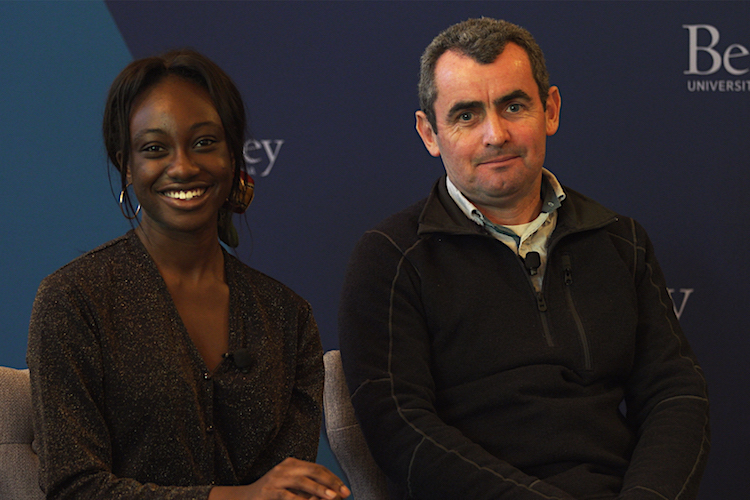Joining forces for a better Berkeley
Leaders of faculty, student groups explain how they help run Berkeley

October 1, 2019
If, as Chancellor Carol Christ often says, UC Berkeley is a collection of neighborhoods, two neighborhood mayors sat down Tuesday to share their vision for Berkeley.
Oliver O’Reilly, chair of the faculty senate and a professor of mechanical engineering, and Amma Sarkodee-Adoo, a fourth-year political science student and president of the undergraduate student government, represent some 2,300 faculty and 30,000 undergraduate students.
The pair each laid out their plans and addressed the key issues facing Berkeley during September’s Campus Conversation, a monthly event where top Berkeley leaders take questions from staff, faculty and students.
O’Reilly and Sarkodee-Adoo discussed how their two organizations, which are sometimes antagonists of Berkeley’s administration, can cooperate on the major issues facing the campus: diversity, housing, shrinking budgets, student anxiety and the urgent need to replace old, seismically unsafe buildings.
“Shared governance is a responsibility, it is a privilege and a responsibility,” O’Reilly said, noting that Berkeley’s Division of the Faculty Senate is one of the most powerful faculty bodies in the country.
Sarkodee-Adoo, meanwhile, noted that the ASUC is perhaps the only student government in the country to be fully independent from the university administration.
“When we come to the table, we’re almost more like a union, in the sense that the chancellor can’t tell me what to do and I can’t tell her what to do, so we are negotiating in a shared governance way,” Sarkodee-Adoo said.
“Everyone wants to see these problems combatted,” Sarkodee-Adoo added.
But what can be done?
Both leaders agreed that using the clout of their organizations to lobby for more state funding or private donors was of high importance.
“Faculty need to figure out how we can advocate better to the public to support the university,” O’Reilly said. “There’s a lot of amazing faculty here who can advocate for the university and who are marvelous at reaching out to different communities. We need their help but we have to figure out how they can help us as well.”
David Robinson, chief campus counsel, will speak at the the next Campus Conversation on Oct. 15.